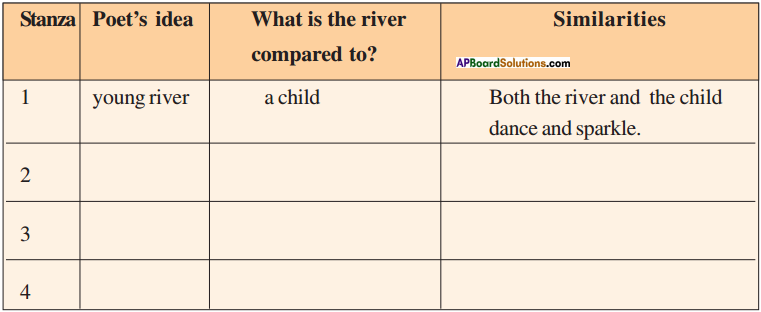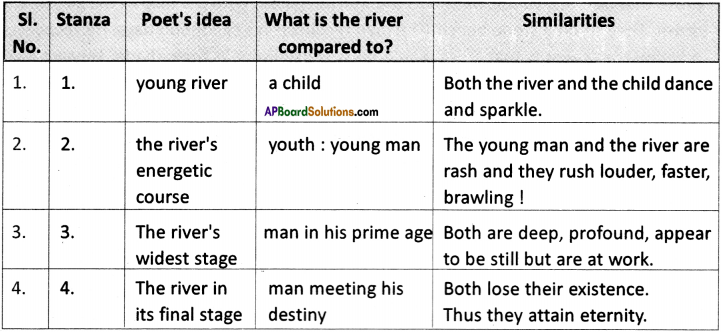AP State Syllabus AP Board 9th Class English Textbook Solutions Chapter 4B The River Textbook Questions and Answers.
AP State Syllabus 9th Class English Solutions Chapter 4B The River
9th Class English Chapter 4B The River Textbook Questions and Answers
I. Answer the following questions.
Question 1.
Is the river like a child? Why?
Answer:
Yes, the river is like a child at the place of its birth. It dances and shines like a child at play.
Question 2.
Why does the poet call it ‘swelling river’?
Answer:
As the river progresses, other streams join it. It widens. It goes on expanding. Hence the poet calls it ‘swelling river.
![]()
Question 3.
‘Seeming still yet still in motion.’ What does the word ‘still’ mean in either case?
Answer:
’Still’ in the first place means ‘motionless’. It is an adjective. ‘Still’ in the second place means ‘even though’. It is an adverb.
Question 4.
How does the sea remind you of eternity?
Answer:
The sea is almost endless. It is vast. It never dries up. Thus it reminds us of eternity.
Question 5.
What do the river and the sea remind the poet of?
Answer:
The river reminds the poet of the ages of man’s life. The sea reminds the poet of the immortality after death.
II. Read the poem once again and list the words in the poem which show the movement of the river at various stages.
Answer:
dancing, rush, sweeping, in motion, tending, dash.
![]()
II. Now, read the last line of each stanza. What do these lines say about the river?
Answer:
The last lines of the stazas tell us the stages of the river. They also compare the river to man in his various ages.
III. What are the word pictures used in the poem? How do they add to the beauty of the poem?
Answer:
Little river, dancing, a child at play, by rose – banks; impetuous youth; mortal prime still in motion ……… These word pictures create beautiful impressions in the minds of readers. Thus they add to the poem’s beauty.
![]()
IV. Read the following comparisons:
‘She skims like a bird.’
‘Her face shines as the moon in the sky.’
Pick out similar expressions from the poem ‘The River’. Say why the poet has made these comparisons. What would you compare them to?

Answer:

1. Now, read the last line of each stanza. What do these lines say about the river?
Answer:
The last line of the stazas tell us the stages of the river. They also compare the river to man in his various ages.
2. Do the river and its movement suggest something eise to you?
Answer:
Yes, the river and its movement suggest to me many things. They are; continuously moving time: gradual but endless progress in every area; man’s life through different ages.
![]()
3. Attempt an appreciation of the poem comparing and contrasting your experience of a river with that of the poet.
Answer:
The poet’s comparison between the river and the child at play is very impressive. But when I see the shining river glide through, I feel a dazzling snake creeping along. And whenever I see the river fall down from rocks I remember the jumping deer. As I see the brimming river the image of vast sky appears in my mind. But the poet’s comparisons refer to man’s ages and there is a continuity. That is because of the maturity and creativity of the poet.
The River Summary in English
C.A. Bowles presents a graphic picture of a river’s course in her artistic poem “The River”. The poet draws an interesting comparison between the river’s progress and man’s ages. The river at the beginning shines and dances like a child at play. Then it swells and runs fast and rash as an impulsive youth. In later stages, it is full and appears to be still. But, it is deep and moves on like man in his prime age. Finally, the river jumps into the sea and attains eternity along with the sea!
The River Glossary
sparkle (v) : shine
pebbles (n – plural): small stones
foliage (n): branches and leaves
glancing (v+ ing): looking at quickly
swelling (v + ing): expanding; increasing
rush (v): move fast
brawling (v + ing): noisily fighting one’s way
impetuous (adj): rash, impulsive ; acting quickly
brimming (v + ing): full
still (adj): without movement
still (adv): despite ; even though
tending (v + ing): moving
mortal prime: man in his important stage
headlong (adj): moving with head in the lead
dash (v): jump ; move
eternity (n): immortaily